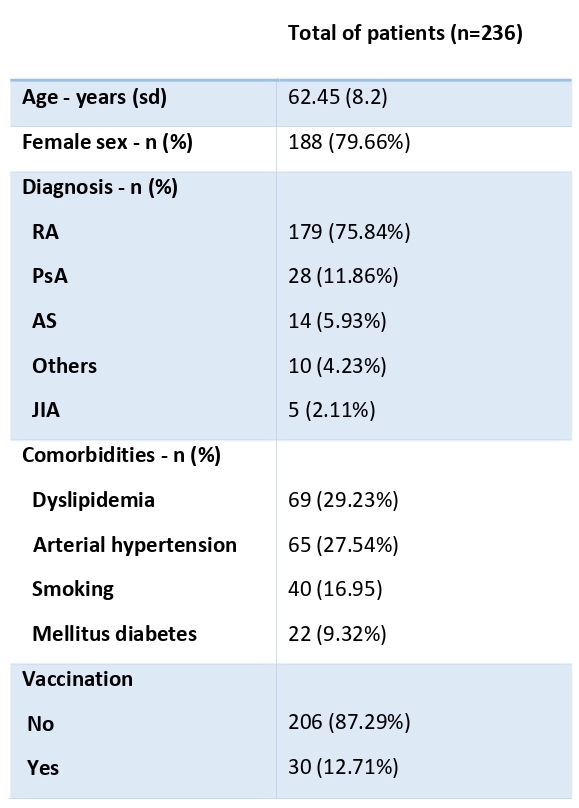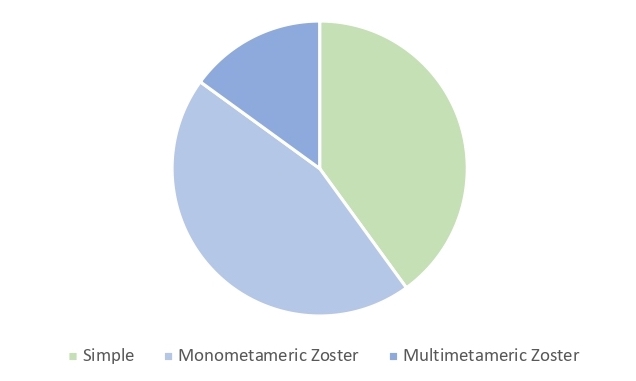Session Information
Session Type: Poster Session A
Session Time: 9:00AM-11:00AM
Background/Purpose: Herpes zoster infection is due to the reactivation of the varicella-zoster virus (VZV), having a high prevalence in elderly and immunocompromised patients. Since the beginning of 2022, a new vaccine that prevents herpes zoster virus reactivation has been approved and commercialized. However, there are few studies analyzing its effectiveness in real-world conditions.
Our purpose is to analyze the incidence and rate of herpes zoster disease in a population at risk due to suffering from rheumatic diseases and therefore being subsidiary of receiving VZV vaccination.
Methods: A retrospective observational study of patients who started treatment with JAK inhibitors from 2013 to 2022 was performed. Demographic and clinical features were collected from the electronic clinical history. Vaccination of patients against VZV was analyzed, as well as the incidence of herpes simplex (HSV) and herpes zoster reactivation before and after January 2022, date on which the vaccination program began. In addition, the rate of the VZV disease was calculated based on the follow-up time for both vaccinated and unvaccinated patients and was adjusted by exposure in events/100 patients-year (E/100 PY).
Results: 236 patients with an indication for vaccination against VZV due to being treated with JAK inhibitors were included, of whom the majority diagnosis was Rheumatoid Arthritis (n=179). Their demographic and clinical features are shown in the following table. 30 patients were vaccinated against VZV (12.71%). An incidence of 20 herpes cases was observed in unvaccinated patients, of them, 8 corresponded with HSV and 12 with VZV. 3 of the VZV reactivations were of multimetameric involvement (see graph). No cases of herpes were found in the vaccinated population. The unvaccinated patients were followed up for 3500 months, remaining with a herpes rate in this population of 4.12 E/100 PY. The total follow-up of vaccinated patients was 102 months, with a herpes rate of 0 E/100 PY.
Conclusion: An incidence of 12 VZV is observed in unvaccinated patients compared to an incidence of 0 in vaccinated patients. The herpes rate in non-vaccinated patients was 4.12 E/100 PY compared to 0 E/100 PY in vaccinated patients. Therefore, we conclude that the herpes zoster vaccine shows its effectiveness in our population but it would be necessary to carry out more studies in the future with a longer follow-up time.
To cite this abstract in AMA style:
Mas Sanchez L, Muñoz Martínez P, Grau Garcia E, Torrat Noves A, Ramos Castro D, Riesco Barcena C, Huaylla Quispe A, Villanueva Mañez B, Alcantara Alvarez I, Leal Rodriguez S, De la Rubia Navarro M, Tovar Sugrañes E, Ivorra Cortes J, Gonzalez Puig L, Negueroles Albuixech R, Vicens Bernabeu E, Oller Rodriguez J, Martinez Cordellat I, Charia H, Canovas Olmos I, Najera Herranz C, Roman Ivorra J. Experience in Real-World Conditions of the Effectiveness of the Vaccine Against Herpes Zoster Virus [abstract]. Arthritis Rheumatol. 2023; 75 (suppl 9). https://acrabstracts.org/abstract/experience-in-real-world-conditions-of-the-effectiveness-of-the-vaccine-against-herpes-zoster-virus/. Accessed .« Back to ACR Convergence 2023
ACR Meeting Abstracts - https://acrabstracts.org/abstract/experience-in-real-world-conditions-of-the-effectiveness-of-the-vaccine-against-herpes-zoster-virus/


